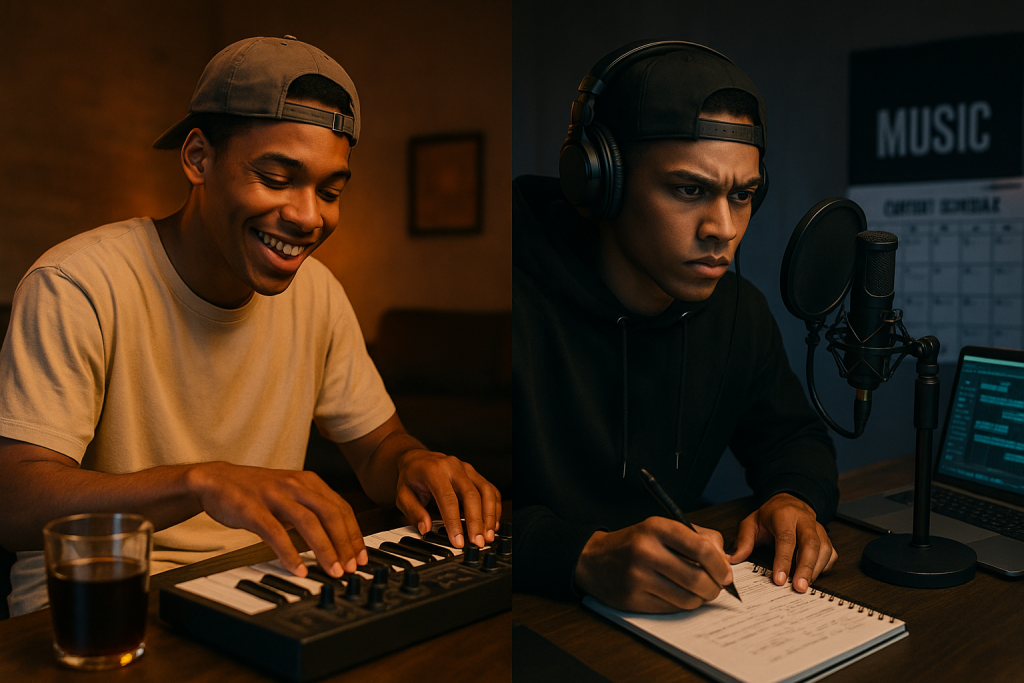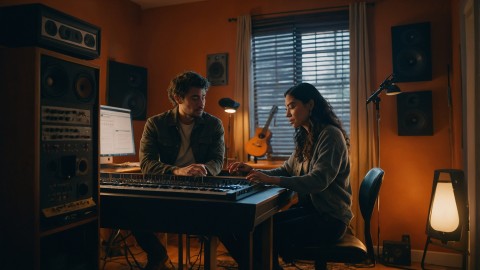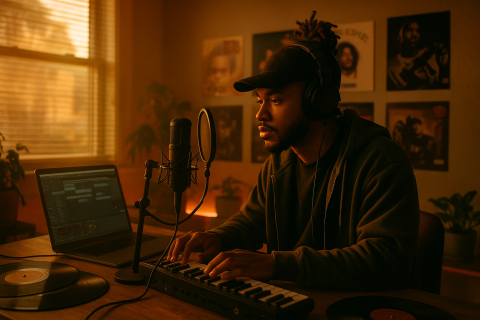In today’s digital world, the music industry has never been more open — or more crowded. Anyone can upload a song, shoot a video, or drop a freestyle at midnight. But not everyone turns their passion into a profession.
The difference between a hobbyist and a full-fledged artist isn’t just talent — it’s mindset, discipline, and consistency. If you’re serious about turning your music into your career, it’s time to shift your identity: from someone who makes music when inspired, to someone building a brand, fanbase, and business.
This guide breaks down how to level up from hobbyist to hustler — and eventually, entrepreneur.
🎯 Step 1: Redefine Your Identity as an Artist
If you treat your music like a side thing, the world will too.
The first step is mental:
- Do you show up for your music like it’s a job?
- Do you set goals or just vibe and wait for inspiration?
- Do you invest in your sound, image, and audience — or wing it when you have time?
Start calling yourself an artist — out loud. That identity shift builds self-respect, and it pushes you to create with more purpose.
“I’m not just making music for fun. I’m building a future from it.”
That’s a powerful declaration. Repeat it.
📅 Step 2: Build a Weekly Creative Routine
Discipline is the bridge between passion and results.
Artists who make consistent progress schedule time to:
- Write lyrics
- Make beats or browse for them
- Record vocals
- Watch tutorials to level up
- Brainstorm content
- Plan releases
Even if you only have 5–10 hours a week, protect that time.
Pro tip:
Block off 2 sessions a week:
- 🎙️ Studio Night (even if it’s a home studio)
- 📈 Strategy Hour – where you work on your brand, business, or fanbase
Think of your calendar like a gym schedule — if you don’t show up, you don’t grow.
🎨 Step 3: Craft Your Brand Identity
Music is emotional. Branding is how you control the feeling people get when they see or hear you.
Your brand is not just a logo — it’s your:
- Aesthetic (photos, colors, fonts)
- Personality (funny, mysterious, spiritual, etc.)
- Story (where you come from + what you stand for)
- Voice (how you talk in captions, videos, interviews)
Ask yourself:
- What does my music feel like?
- What 3 words describe my vibe?
- What kind of people are naturally drawn to my sound?
Then make sure your visuals, captions, bios, and tone match. Consistency builds trust. Trust builds fans.
📱 Step 4: Turn Studio Time Into Content
We’re in the attention economy. If you’re only creating songs and not documenting the process, you’re leaving value on the table.
Turn every studio session into 3–5 pieces of content:
- 🎥 Time-lapse of you recording
- 🎤 Raw acapella bars
- 🧠 “What inspired this song?” breakdown
- 🤯 Before & after: scratch demo vs. final mix
- 🧩 TikTok clips teasing unfinished verses
Your audience wants to feel involved. When they see the effort behind your art, they root for you harder. And that turns listeners into supporters.
📈 Step 5: Track Your Progress Like a Business
Real businesses track metrics. So should you.
What to measure:
- Monthly listeners & followers on streaming
- Engagement rate on social media
- Email subscribers / text list signups
- Merch sales or show ticket conversions
- ROI on ads or promo
Use a simple Google Sheet. What gets measured gets managed. The more you treat this like a business, the more momentum you’ll gain.
Also: set 90-day goals.
✅ Examples:
- Drop 3 singles
- Grow IG by 1,000 followers
- Book 2 paid performances
- Collaborate with 3 producers
💡 Step 6: Build a Team (Even if It’s Just 1 Person)
You can only go so far alone.
Start looking for collaborators:
- 🎧 Producers who understand your sound
- 🎬 Videographers with a similar aesthetic
- 💻 Friends who love marketing and might help
- 📸 Local photographers building their portfolio
Even one person who believes in your vision can 10x your energy and output.
Don’t wait for a label. Build your own ecosystem.
💰 Step 7: Start Monetizing Your Music (Small But Smart)
You’re an artist. But you’re also a business. Time to act like it.
Start simple:
- Distribute your music through DistroKid or UnitedMasters
- Link a merch store (even if it’s just 1 design on Printful)
- Collect emails from fans (use Mailchimp or Beacons)
- Add a tip jar or Patreon for exclusive behind-the-scenes content
- Offer hooks or verses on Fiverr
Money isn’t the goal — freedom is. And monetization gives you the leverage to reinvest, scale, and stay independent.
🤝 Step 8: Build Real Relationships with Fans
Don’t chase clout. Cultivate community.
That means:
- Reply to DMs
- Comment back
- Shout out early supporters
- Go live and talk with no agenda
- Show gratitude often
Your first 100 fans will remember how you treated them. Word spreads. Loyalty grows from interaction.
“You don’t need millions — you need 1,000 true fans.”
– Kevin Kelly
If 1,000 fans each give you $100/year (through shows, merch, etc.), that’s a six-figure career.
📚 Step 9: Study the Game Like a Student
Music is art. But the music business is a science.
You should be:
- Watching interviews with successful indie artists
- Reading books like All You Need to Know About the Music Business by Donald Passman
- Listening to music industry podcasts
- Studying successful rollouts (what did they do right?)
- Joining artist communities (Discords, Reddit, local scenes)
Learn the rules. Then break them with intention.
💥 Step 10: Commit for the Long Haul
Here’s the realest part of the journey:
Most people quit too early.
They drop a few singles, see low numbers, and give up. But the artists who win are the ones who outlast the early struggle.
If you commit to showing up consistently for 1–3 years, you’ll be ahead of 90% of people.
Some songs won’t land. Some months will be dry. But each step you take builds the catalog, credibility, and community you need to break through.
Final Word: You Deserve to Take Yourself Seriously
If you’re reading this, you’ve already felt the calling. That pull to turn your gift into your grind.
You don’t need a co-sign. You don’t need a viral moment.
You need to make a decision.
👉 Are you going to keep treating music like a side project?
👉 Or are you ready to step into your purpose?
Hobbyist energy fades. Hustler energy builds.
And when you start moving like a professional, the world starts treating you like one.
Now get back in the studio. But this time… take notes.








